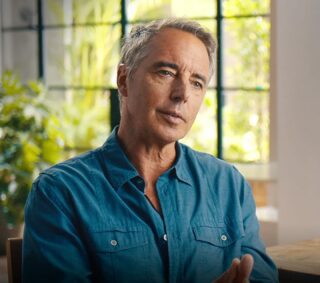Dementia is expected to affect 150 million people by 2050, a huge leap from the 50 million people who currently live with the condition. It’s a startling figure and with no cure in sight, it’s important to find ways in which to mitigate the condition. With that, author and explorer Dan Buettner may have found the secret to reducing dementia risk, and he discovered these secrets in the Blue Zone island of Ikaria.
Dan Buettner: 3 Anti-Aging Ways Ikaria Is Avoiding Dementia
“In America, if you hit age 85, there’s about a 50% chance you’re beginning to suffer or are suffering from dementia. We found about 97% of people over age 70 [in Ikaria] and only three mild cases of dementia on the entire island.” – Dan Buettner
In 2004, Buettner and a group of researchers discovered regions of the world that had the lowest rates of middle-age mortality. These five areas across the world, referred to as “Blue Zones”, were virtually free of the disease and featured many residents that lived to age 100 and beyond.
Ikaria is one of the five Blue Zones and, per Buettner’s Instagram posts, it holds the secrets to not only living longer but also reducing the risk of dementia.
1. A strict Mediterranean diet
According to Buettner’s research, Ikarians follow an “extreme version” of the Mediterranean diet.
As we know, the Mediterranean diet is considered the healthiest diet in the world, particularly because it features a range of fruits and vegetables, whole grains, lentils and olive oil. In addition to this, Ikarians also regularly consume fish and wild greens like dandelion, chicory, amaranth, arugula, and nettles.

danbuettner/Instagram
Regarding Ikarians’ eating habits and dementia risk, a 2023 study published in BMC Medicine analyzed 60,000 older adults in the UK. They found that those who strongly adhered to a Mediterranean diet faced a 23% lower risk of developing dementia over a nine-year period than those with the lowest level of adherence.
In terms of fish consumption, a separate and more recent study found a strong association between high fish consumption and an 18% lower risk of dementia and a 15% lower risk of Alzheimer’s.
As for the wild greens, these vegetables are typically high in antioxidants, vitamins A and C, calcium and iron, all of which offer neuroprotective benefits.
2. Keep moving
Ikaria’s landscape is beautiful and quite mountainous. As such, there’s a lot of movement required from the residents if they want to get around,
“These people are living in villages and walking up and down hills every day. They’re nudged into movement every 20 minutes or so.” – Dan Buettner
Sedentary living is one of the easiest ways you can send yourself to an early grave. A study published in JAMA found that being physically inactive for 10 hours increased dementia risk. The risk rose to 50% after 12 hours and almost tripled at 15 hours.
It’s important not to spend your days sitting in the office or in front of the TV. Try to incorporate breaks throughout the day, and include an afternoon walk if you can.
3. Maintain community
According to Buettner, there are strong social connections in Ikaria, revealing that, “Loneliness is not an option in Ikaria.”
The strong sense of community in Ikaria is a great way to combat loneliness. Findings published in Alzheimer’s & dementia:the journal of the Alzheimer’s Association revealed an association between good social connection structure and quality and lower risk of incident mild cognitive impairment (MCI). The study also identified an association between social structure and function and lower risk of incident dementia and mortality.
If you’re hoping to grow your social connections, why not join a local club that focuses on your interests? This can be a gardening, book, running, or knitting club.
Want to know more?
Dan Buettner shared that cities with the highest healthspan often have residents taking up to 50% of all trips on foot or bike. So, could creating bike-friendly cities be the key to longevity?
References
@DanBuettner(2024). Instagram. Available at: https://www.instagram.com/DanBuettner(Accessed: 06 October 2024)
Godos, J., Micek, A., Currenti, W., Franchi, C., Poli, A., Battino, M., Dolci, A., Ricci, C., Ungvari, Z., & Grosso, G. (2024). Fish consumption, cognitive impairment and dementia: an updated dose-response meta-analysis of observational studies. Aging clinical and experimental research, 36(1), 171. https://doi.org/10.1007/s40520-024-02823-6
Guarnera, J., Yuen, E., & Macpherson, H. (2023). The Impact of Loneliness and Social Isolation on Cognitive Aging: A Narrative Review. Journal of Alzheimer’s Disease Reports, 7(1), 699-714. https://doi.org/10.3233/ADR-230011
Mahalingam, G., Samtani, S., Lam, B. C. P., Lipnicki, D. M., et al. (2023). Social connections and risk of incident mild cognitive impairment, dementia, and mortality in 13 longitudinal cohort studies of ageing. Alzheimer’s & dementia : the journal of the Alzheimer’s Association, 19(11), 5114–5128. https://doi.org/10.1002/alz.13072
Raichlen, D.A., Aslan, D.H., Sayre, M.K., Bharadwaj, P.K., Ally, M., Maltagliati, S., Lai, M.H.C., Wilcox, R.R., Klimentidis, Y.C. and Alexander, G.E. (2023). Sedentary Behavior and Incident Dementia Among Older Adults. JAMA, [online] 330(10), pp.934–940. doi:https://doi.org/10.1001/jama.2023.15231.
Shannon, O.M., Ranson, J.M., Gregory, S. et al. (2023). Mediterranean diet adherence is associated with lower dementia risk, independent of genetic predisposition: findings from the UK Biobank prospective cohort study. BMC Med 21. https://doi.org/10.1186/s12916-023-02772-3
World Health Organization (2023). Dementia. [online] World Health Organization. Available at: https://www.who.int/news-room/fact-sheets/detail/dementia.



![women [longevity live]](https://longevitylive.com/wp-content/uploads/2020/01/photo-of-women-walking-down-the-street-1116984-100x100.jpg)










